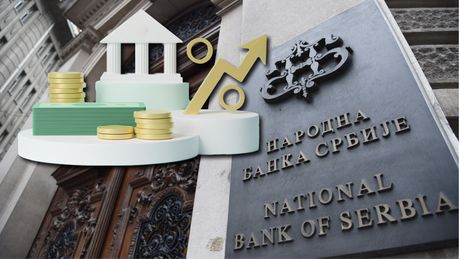Serbian central bank (NBS) continues hiking key policy rate: What could "cool down" inflation?

At its meeting today, the NBS Executive Board voted to raise the key policy rate by 25 basic points (bp) to 6%. The rates on deposit and lending facilities were raised to 4.75% and 7.25%.
In making the decision, the Board judged that further moderate tightening of monetary conditions is necessary to preclude a rise in inflation expectations and ensure that inflation hits a downward trajectory and returns within the target tolerance band over the projection horizon.
The pass-through of key policy rate hikes so far to the interest rates in the markets of money, loans and savings signals the efficiency of the monetary policy transmission mechanism through the interest rate channel.
"At the same time, by maintaining relative stability of the dinar exchange rate against the euro, the NBS significantly contributes to containing the effects of the spillover of rising import prices onto domestic prices, and to overall macroeconomic stability amid heightened global uncertainty," the NBS announced.
The Board added that further decline in energy prices, resolution of global supply bottlenecks and a reduction in container transport costs largely contributed to the easing of cost-push pressures globally, which should slow inflation at home.
Uncertainty over global growth and concerns over recession in advanced economies resulted in a further decline in primary commodity prices. Still, the Board underlines that monetary policy caution is needed due to the persisting geopolitical tensions over the Ukraine conflict, and the fact that the indirect effects of elevated prices of energy and industrial raw materials in the past period, along with the labor market, are still keeping core inflation at a relatively high level in most countries, which reflects on imported inflation in Serbia.
This is true primarily for the euro area, our key trade partner, where, according to preliminary data, despite a reduction in headline inflation to 6.9% in March (from 8.5% in February), core inflation increased further, to 5.7% y-o-y (from 5.6% in February).
February headline inflation amounted to 16.1% y-o-y, consistent with the NBS’s projections for Q1 which factored in the anticipated continuation of high cost-push pressures from the prior period on the prices of food and other industrial products, as well as the revision of electricity and gas prices.
(Telegraf Biznis)
Video: Macut: Trenutno su u toku projekti izgradnje čak 5 auto-puteva
Telegraf.rs zadržava sva prava nad sadržajem. Za preuzimanje sadržaja pogledajte uputstva na stranici Uslovi korišćenja.

